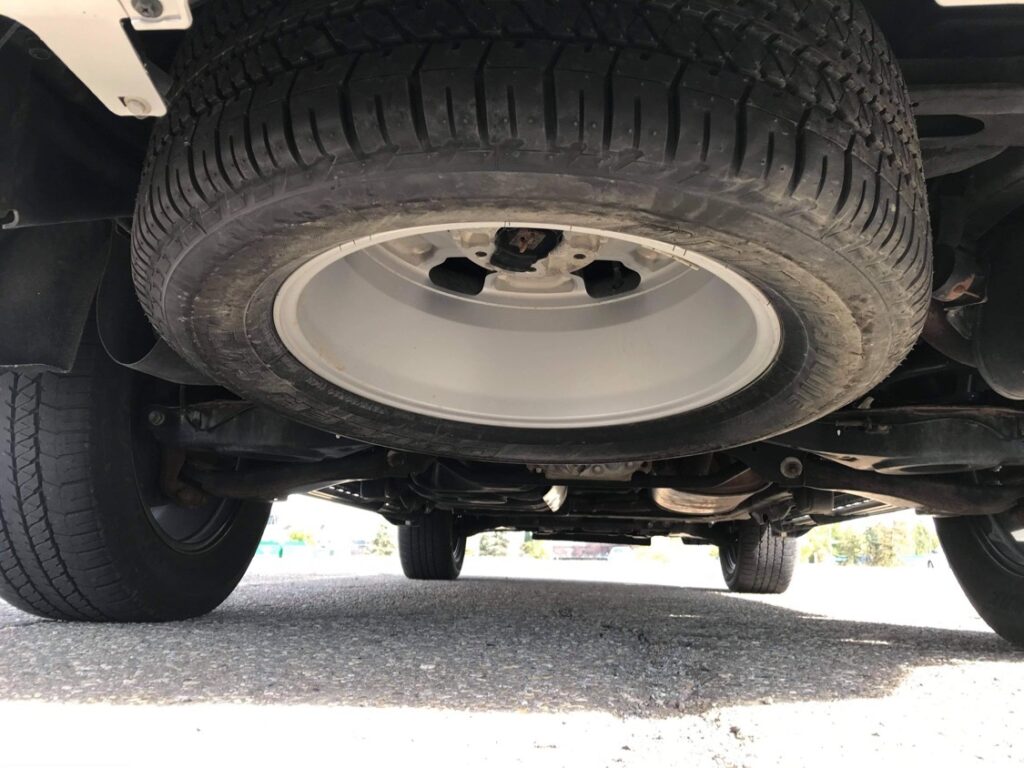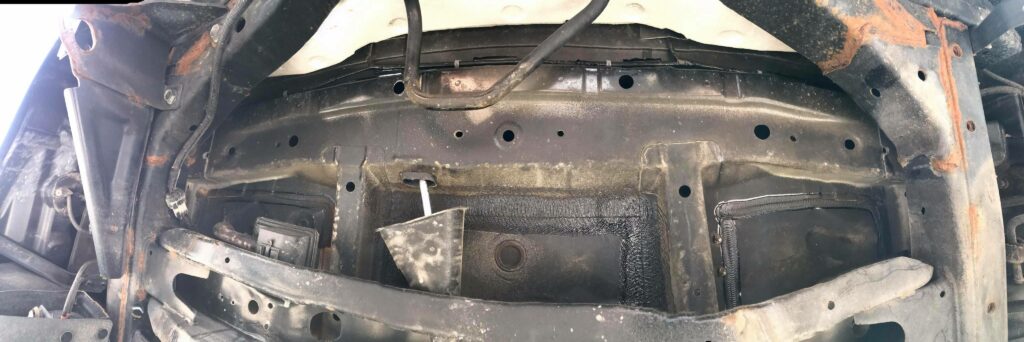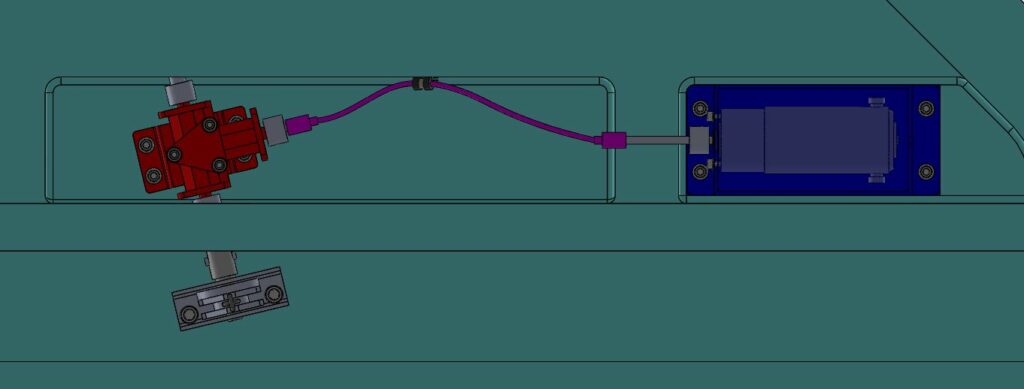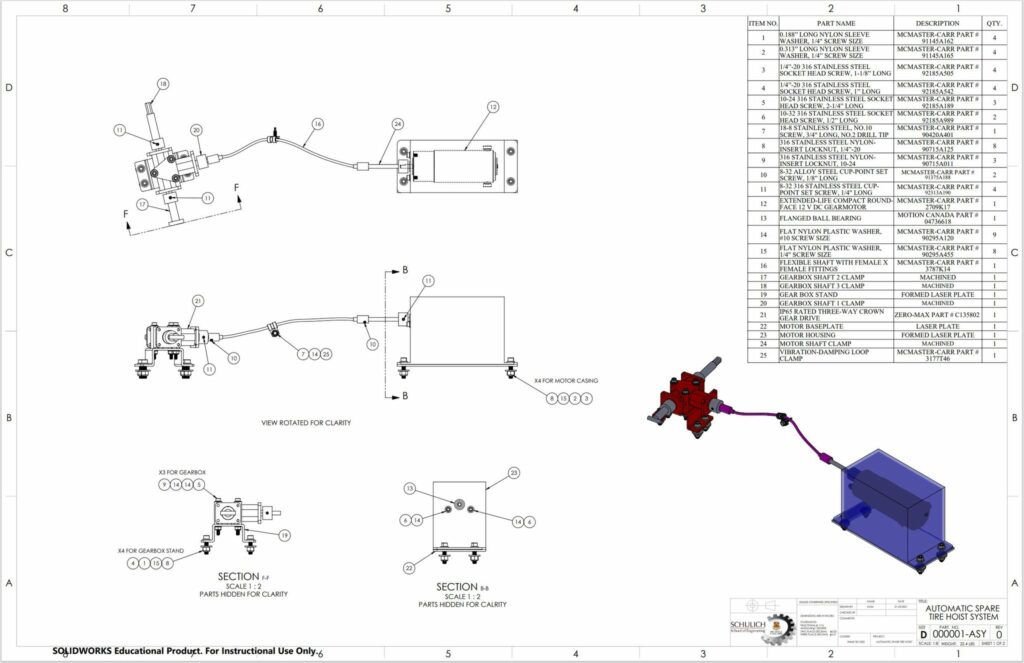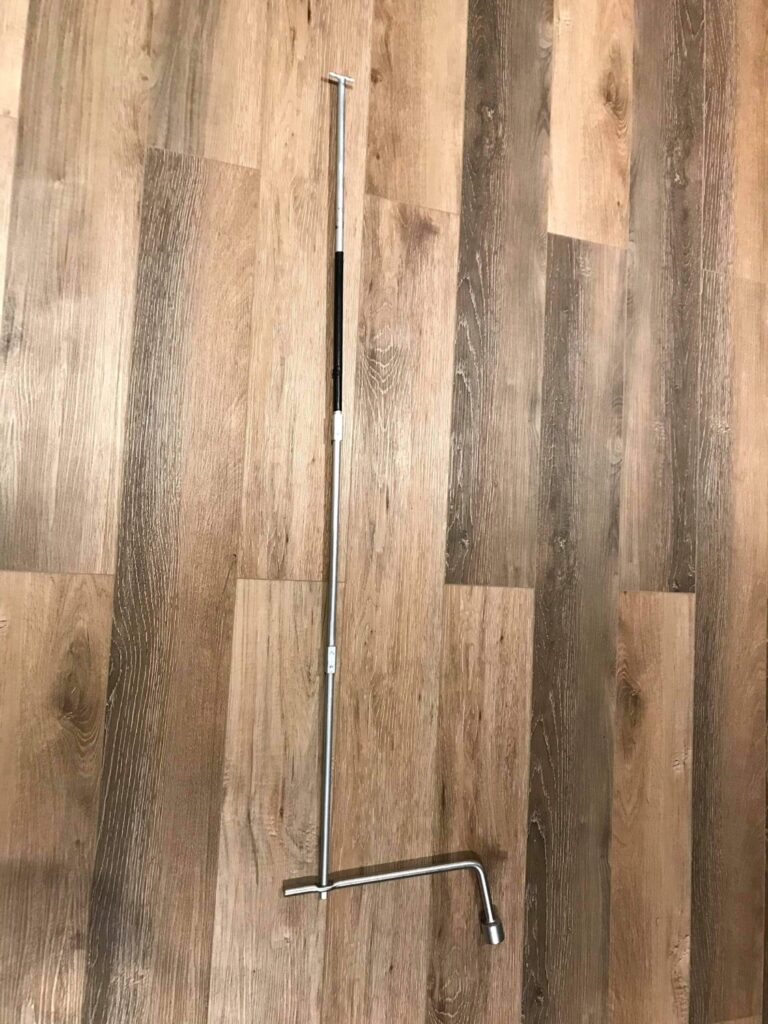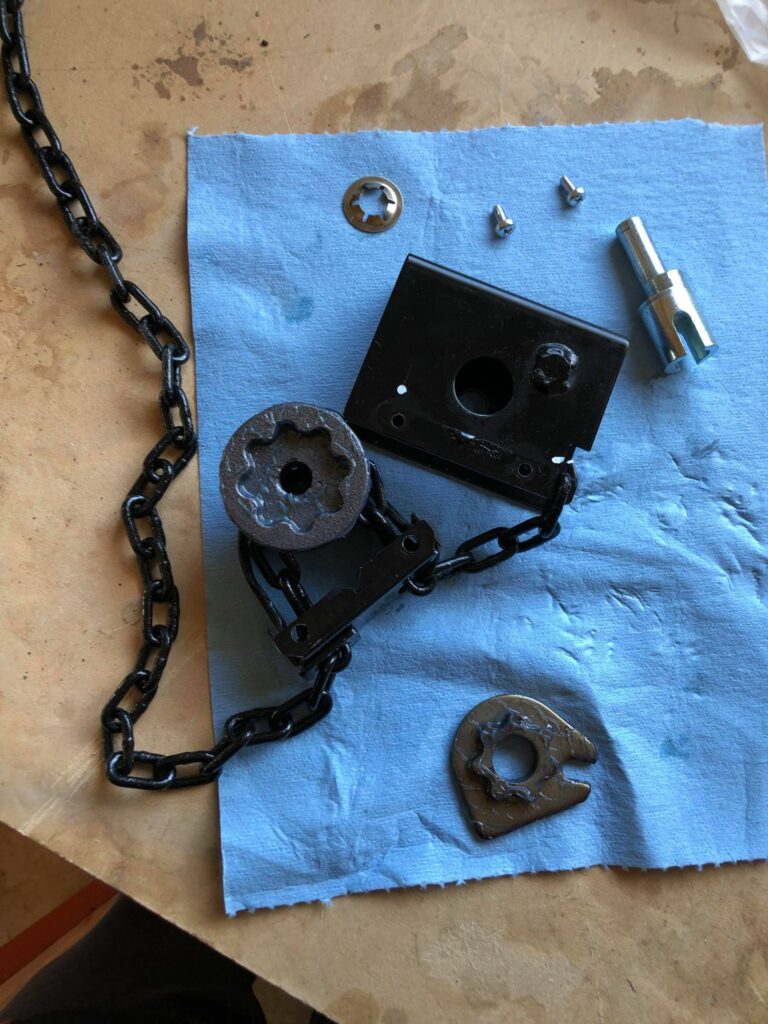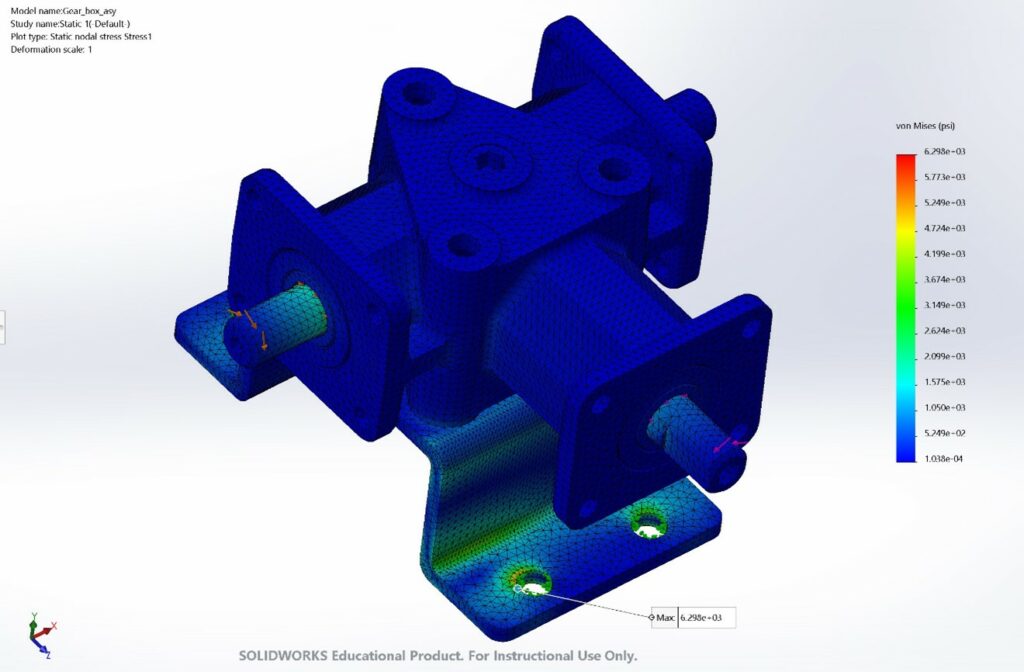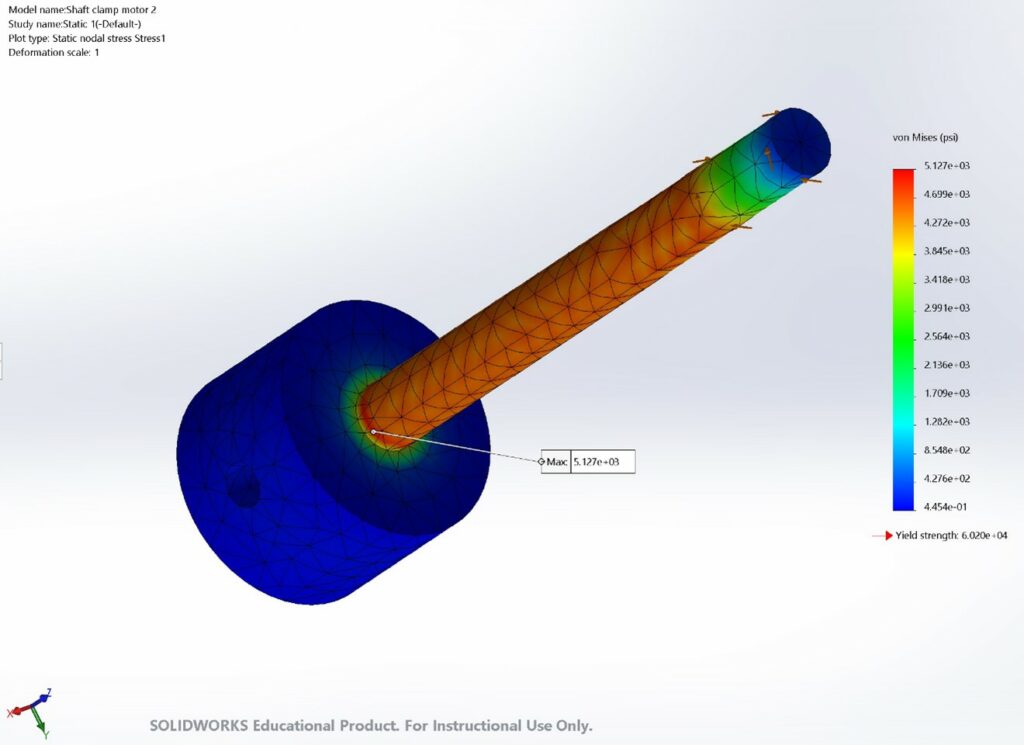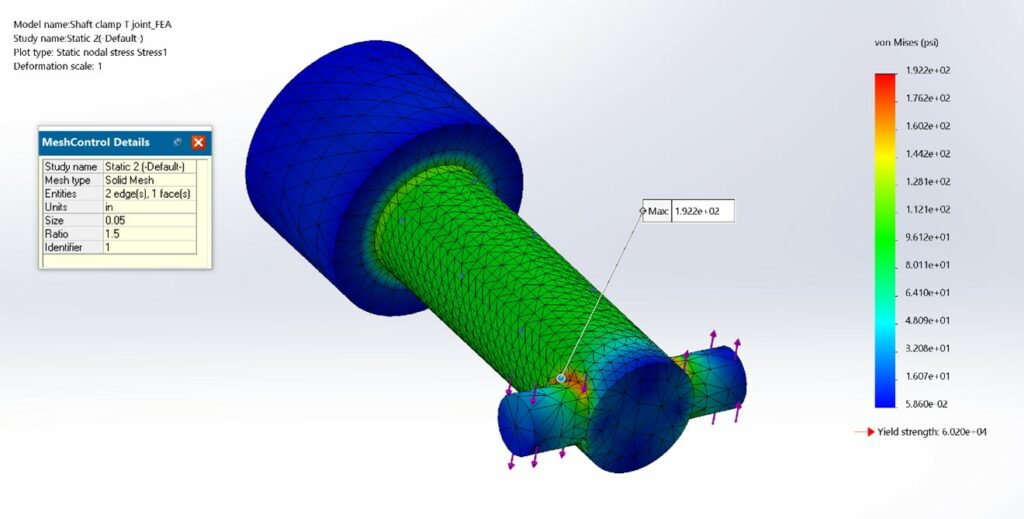Project Category: Mechanical
Join our presentation
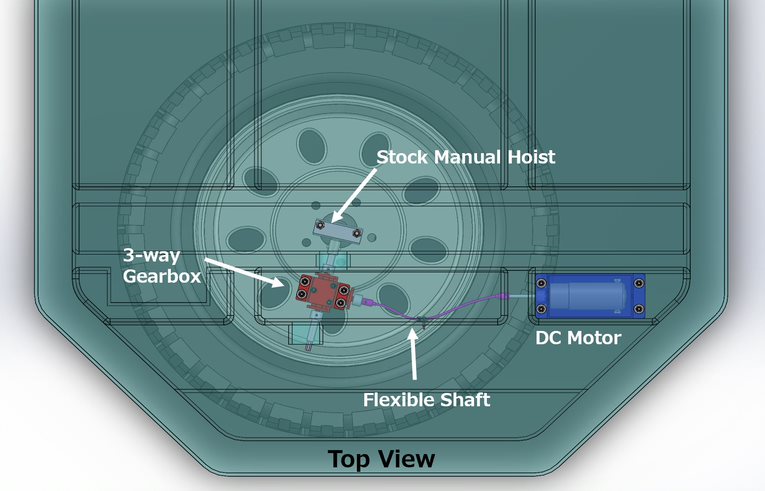
About our project
The vast majority of light duty trucks and large SUVs require the manual operation of a spare tire hoist to access the spare tire stored underneath the rear end of the vehicle. Often this involves a lengthy and difficult process of first assembling a long extension rod, next it needs to be blindly connected to the hoist input shaft, and lastly the shaft needs to be rotated a minimum of 30-35 revolutions before the spare tire has been completely lowered to the ground. In total, this procedure of just lowering the tire can take upwards of 5 minutes, even for a person who is experienced in performing the task. Our team has designed an automatic spare tire hoist that is specifically designed to be used on the Nissan Armada 2017-2021 model with the objective of automating the entire process and completing it in 30 seconds per direction. The final design solution consists of 3 main components: a 12V DC motor, a flexible shaft, and a 3-way gearbox. This drivetrain is powered from the vehicle’s battery and is simply activated from a push button located in the cab of the vehicle. With no major modifications required to the vehicle’s undercarriage, the automatic spare tire hoist components are mounted discretely underneath the vehicle and are built durable enough to resist all the road has to offer.
Meet our team members
Ahmed Mohamed
Luke Vincent
Ariz Ahmad
Garrett Young
Thai Giang
Kate Byrnes

Details about our design
HOW OUR DESIGN ADDRESSES PRACTICAL ISSUES
Experiencing a flat tire is among the top 5 most common reasons for a vehicle breakdown, and in the US alone there are approximately 200 million flat tires per year[1,2]. Just because someone has a driver’s license does not guarantee that they have the knowledge or expertise to access their spare tire. This design addresses any uncertainties that vehicle owners may have about lowering/raising their spare tire and completes the task in a fraction of the time. No more fighting with awkward tools and withstanding the extreme cold or hot temperatures during an already inconvenient breakdown. With the press of a button, one of the most time extensive steps of fixing a flat tire can now be automated. Instead, focus on jacking up your truck or just sit back and watch the automatic spare tire hoist do all the work.
[1] Sinanan, “5 Most Common Reasons for a Car Breakdown,” June 2018. [Online]. Available: https://micromech.net/car-advice/5-most-common-reasons-for-a-car-breakdown. [Accessed 27 September 2020].
[2] “Flat Tire Facts,” October 2017. [Online]. Available: https://theinflator.com/flat-tire-facts. [Accessed 24 November 2020].
WHAT MAKES OUR DESIGN INNOVATIVE
The method for lowering/raising a spare tire from underneath any pick-up truck or large SUV has always been manual. Manual mechanisms can get the tire up and down, but not without any struggle. The innovative aspect of the design is the ability to lower and raise the spare tire with zero manual labour, all while making the process at least 6x faster. The design makes use of the stock manual spare tire hoist, reducing the overall unit cost and minimizing the modifications required to your vehicle’s undercarriage. The 3-way gearbox used in the mechanism is driven primarily by a 12V DC motor, but the secondary input shaft accommodates a manual input using the tools provided with the vehicle for any scenario where the motor is unavailable. This innovative design solution offers reliability and durability in a product that cannot currently be purchased from any vehicle manufacturer or aftermarket automotive parts supplier.
WHAT MAKES OUR DESIGN SOLUTION EFFECTIVE
The effectiveness of any design is determined by its operational limits. The automatic spare tire hoist was built to withstand the harshest elements the road can throw at you in any location the Nissan Armada is sold. Details like ingress protection, corrosion protection, and temperature ranges of each component were carefully selected to match the design constraints and to last the average lifetime of the vehicle. Incorporating fail safe features by adding a manual input is key to ensure you will not be left stranded on the road because the tire cannot be lowered. The design takes manufacturing and assembly into account by solving the design problem in a way that is effective but simple to ensure that any automotive shop can install the package quickly. Alignment issues are eliminated by using a flexible shaft and majority of the parts can be assembled before getting underneath the vehicle. None of the components require maintenance schedules, giving the consumer peace of mind that this system will only have one initial payment.
HOW WE VALIDATED OUR DESIGN SOLUTION
The first step was to get dirty and take measurements of the undercarriage, which gave us an accurate understanding of the space we had to work with. Step two was to purchase the original manual spare tire hoist to determine what input torque could lift the 80 lb spare tire. Without building a physical prototype as validation, our design solution was modelled and evaluated through a combination of computer-aided engineering and manual calculations. After modelling the entire assembly using Solidworks, the FEA function verified that the components would not fail due to the forces acting on the system. Upon validation of the mechanical properties of the parts and assembly, a motion simulation was completed to ensure that the system would operate as expected when fully assembled and achieve the performance metric of lowering or raising the spare tire in 30 seconds. The motor control sequence was implemented on a smaller scale DC motor using an Arduino board; as advertised, the motor can be operated by the press of a button with the program that was developed. Based on a combination of theoretical and real-life evaluations, we have a product that is ready to be prototyped and put into action.
FEASIBILITY OF OUR DESIGN SOLUTION
The component and material cost of the entire assembly came in under our $1500 budget that was justified by the increased performance compared to the $320 manual hoist already installed. The design was created to minimize unnecessary parts, material, and fasteners and take advantage of off-the-shelf items from various manufacturers. Custom parts that our team designed were done with the intent of using routine manufacturing processes with limited steps involved to enhance the efficiency for large scale production. The unique ability of having custom shaft clamps on the gearbox and a flexible shaft allows the possibility of adapting this design to work for a variety of other vehicle manufacturers.
Partners and mentors
We want to thank those who helped us with this project. Our mechanical engineering professor Dr. Philip Egberts, as well as our teaching assistant Danny Wong, guided us through the process with patience and great advice.
Our photo gallery
*To enlarge images, right click to open the image in a new tab


